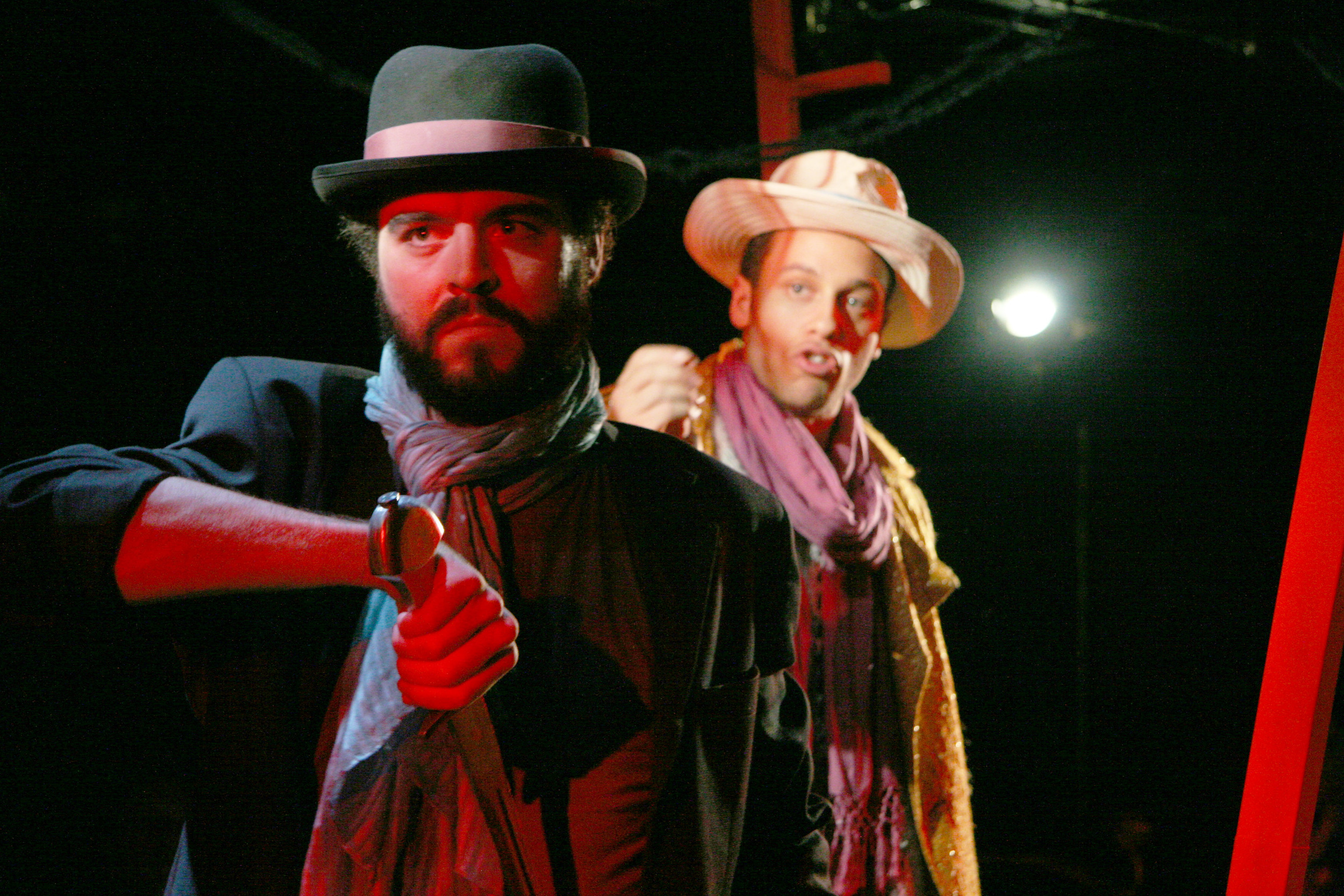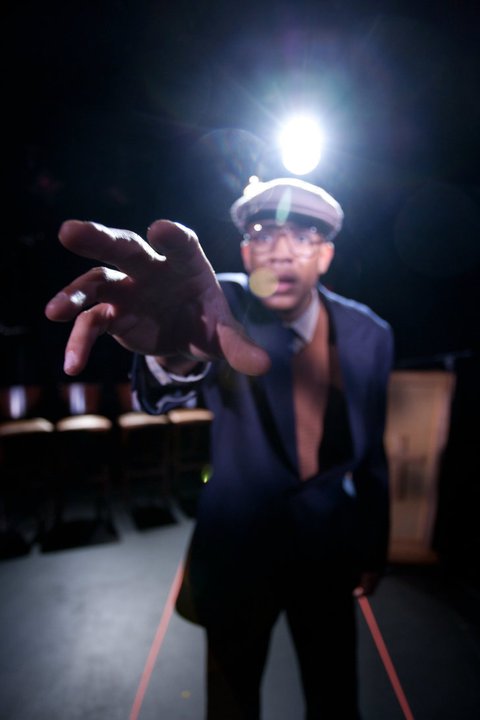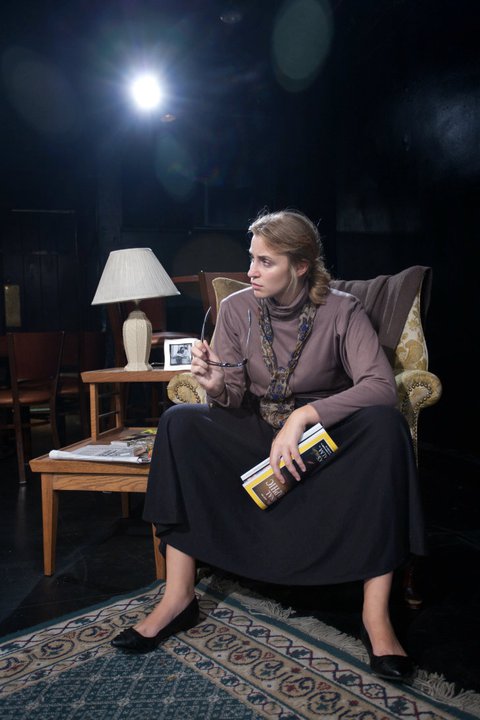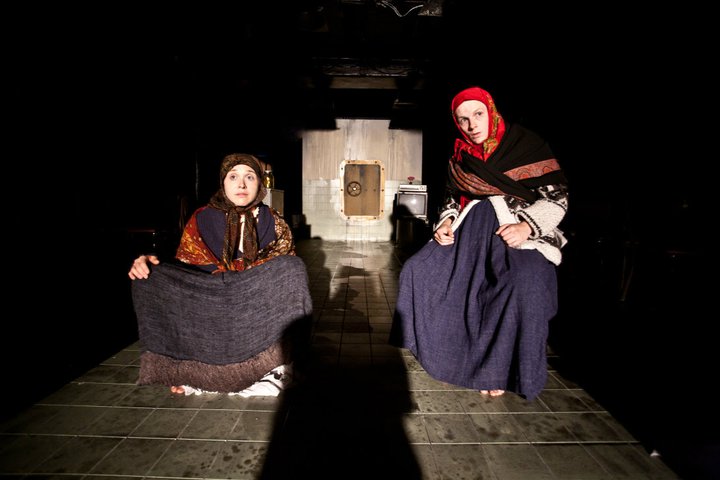A comic Tempest opens the Yale Summer Cabaret Shakespeare Festival The Yale Summer Cabaret’s ambitious Shakespeare Festival, brain-child of Devin Brain and Tara Kayton, has launched. The first play in the series, which will run three plays in repertory with a dedicated company of ten actors through August 14, is The Tempest. A late play, if not the last, in Shakespeare’s canon, it’s a fantastic and lively tale in which all’s well that ends well, but, along the way, it gives much food for thought about the arbitrary nature of power relations, of courtship, of claims to authority, and, in this production especially, some laughs.
There are two daring and potentially off-putting aspects to director Jack Tamburri’s production: the first has to do with design (Kristen Robinson and Andrew Freeberg are the Scenic Design team), and involves fixed stilts with foot- and hand-holds placed at strategic points across the playing space. This is the airy province of that airy sprite Ariel (Adina Verson), who touches ground as rarely as possible, primarily at entrances and exits. But no matter how gamely and gracefully Verson navigates the gym course, we don’t get an illusion of movement swift as thought (Ariel’s special quality) and tend to be distracted by the actions. What’s more, the posts offer little in the way of scenery, even if, with the aid of some magical transformative power akin to Propsero’s, we imagine them as trees upon the island. The benefit: Ariel hovers over the action and speaks to the other characters from slightly above, which creates some nice effects in dialogue with Prospero when his captive sprite speaks directly into his ear, or when “he” (Ariel is male; Verson is female, and plays the role in a shiny body suit with a noticeable jockstrap bulge) spooks the conspirators from somewhere in the air above them.
The other oddity here is that all the cast members play Prospero at some point. This requires much shedding and donning of the sparkly cloak that denotes our magical majesty, and also increases potential confusion for viewers having enough trouble keeping, say, Antonio and Trinculo (both played by Paul Lieber) or Alonso and Stephano (both A. Z. Kelsey) straight. In other words, go with some of the play under your belt or you may find yourself a bit at sea. Some of the transformations are indeed swift as thought, especially in the denouement when the passing about of Prospero’s book began to resemble a game of hot potato.
The more problematic aspect of this innovation is that, to echo Gertrude Stein’s comment about Oakland, there isn’t any there (or Prospero) there. Rather, we get six actors in search of a character, which translates into Prospero-schtick most of the time. This, I assume, is strategic—an effort to undermine this dominant figure, to make him as mercurial as possible, and to show that the trappings of power he wields can indeed be taken up and shed by turns. He is a sometime Duke and a sometime magus, a sometime father, brother, and so on. The point, as it should be in theater, is made, as it were, between the lines, but I couldn’t help feeling it was also made at the expense of some lines—as when an actor fully steeped in the role allows us to watch the character change, rather than watch a number of actors change into the character.
The strengths of this production: First of all, the language. Short of slowing things down into Shakespeare-ease, as Kenneth Branagh films sometimes do, the cast is quite adept at making Shakespearean speeches sound spoken as opposed to recited. Second: the audience’s closeness to the action made for enlivening effects when the characters spoke directly to audience members in a conversational way. Third: the clowns—and, as all are at times Prospero, all are at times clowns. It’s to the audience’s benefit that these actors are so good at Shakespearean comedy, which can get tedious fast when a cast isn’t. Kelsey, as Stephano, a butler, and Paul Lieber, as Trinculo, a jester, in particular, made the most of their scenes together, often involving drunken mood swings, but more modulation of tone would’ve helped us perceive their transformations into, respectively, Alonso, King of Naples, and Antonio, Prospero’s usurping brother, as they seemed a bit too broad for aristocracy.
Tim Brown, on the other hand, moved effectively between Sebastian, the rather dim-witted brother of the King, and romantic lead Ferdinand.
A female actor as Caliban is a move against type for it makes for a more refined “monster,” and Brenda Meaney’s performance, while active and comic, lacked the surly pathos the role can command. Casting a female actor as Ariel is not unusual, and, apart from her headdress and costume, I loved everything about Verson’s Ariel, particularly the glowing sound of her vocals on the songs and her childish enthusiasm in playing all the roles, with Adam Rigg’s effective puppets, during the enchantment scene. Her rendition, as Prospero, of the curtain speech was effective enough to make one willing, indeed, to “free all faults.”
All in all, a rough and ready Tempest on its way to becoming seaworthy.
The Yale Summer Cabaret Shakespeare Festival Devin Brain, Artistic Director; Tara Kayton, Producer June 23-August 14, 2011
William Shakespeare’s The Tempest; Directed by Jack Tamburri June 23-August 12, 2011
Photos by Ethan Heard, courtesy of Yale Summer Cabaret














